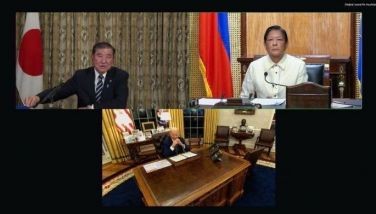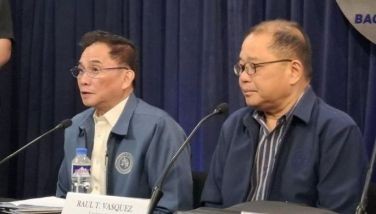‘Congress can touch only 36% of 2015 budget’
MANILA, Philippines - The proposed national budget for next year may be in the trillions, but Congress can touch only about a third of it, the chairman of the House appropriations committee said yesterday.
The bigger part or two-thirds is in the form of mandatory appropriations like those for debt payments, salaries and internal revenue allotment (IRA) representing the share of local government units in national taxes, Davao City Rep. Isidro Ungab said.
“The P2.606-trillion expenditure budget for 2015 appears to be huge at face value. However, stripped of the virtually mandatory items amounting to P1.668 trillion or 64 percent of the total budget, only about 36 percent or P937.5 billion may be the subject of congressional debate,” he said.
“The 64 percent includes, among others, allocations for personnel services (salaries) of P761.745 billion, financial expenses of P374.543 billion (which includes debt servicing of P372.862 billion), IRA of P389.860 billion, other automatic appropriations of P72.698 billion and foreign assisted projects of P69.574 billion,” he said.
He added that the 36-percent portion that is subject to congressional scrutiny is made of up maintenance and other operating expenses of various agencies amounting to P488 billion and about P449.5 billion for capital outlay for the implementation of various infrastructure projects and the acquisition of machinery and office equipment.
Ungab made the statement at the start of plenary debates on the proposed 2015 budget.
He said the spending proposal is 15.1 percent or P341 billion higher than this year’s P2.265 trillion.
“The 2015 budget is anchored on the premise that no one, especially the poor and vulnerable, will be left behind. Through this budget, the government intensifies its investments in priority programs and projects that seek to achieve inclusive and sustained development,” he said.
He said in terms of allocation by sector, social services will get the highest share at P967.9 billion or 37.14 percent, followed by economic services at P700.2 billion or 18.05 percent, general public services, P423.057 billion or 16.23 percent; debt service, P399.4 billion or 15.33 percent; and defense, P115.530 billion or 4.43 percent.
He added that to support the proposed budget, the Bureau of Internal Revenue and the Bureau of Customs have to collect P2.337 trillion, while the balance would be funded through borrowings.
“Once again, we will not allow these two major revenue generating agencies to have excuses for not collecting their targets. Congress has supported their reform initiatives, but they must remain answerable for any deplorable performance to the whole Filipino people,” he stressed.
He pointed out that the revenue target of P2.337 trillion represents a 15.8 percent increase over the 2014 level and is equivalent to 16.5 percent of gross domestic product.
“We have been privileged to represent our people and as we commence the plenary deliberation on the 2015 budget, we should not lose sight of the democratic fact that it is their voice, and not ours, that should be heard; that is their interests, and not ours, that should prevail; and that it is their money, and not ours, that we are appropriating,” Ungab told his colleagues.
Redefinition justified
Meanwhile, Budget Secretary Florencio Abad told reporters on the sidelines of the plenary discussions there is justification for President Aquino’s request for Congress to redefine government savings.
Aquino is seeking authority to suspend project appropriations for “justifiable causes” at any time during the budget year, declare the funds as savings and use them for other programs, activities or projects.
Under the Supreme Court ruling on the Disbursement Acceleration Program (DAP), the President is prohibited from suspending appropriations and using savings before the end of the year.
Abad said there are instances when funding should be suspended and realigned.
“For instance, a bridge or road project can no longer be undertaken in an area devastated by a typhoon, or a road project that gets entangled in a right-of-way issue in the courts. What are you going to do with the money in those cases? Those instances are justifiable causes for suspending and realigning funding,” he said.
He said the authority the President is seeking is not to impound appropriations arbitrarily.
For his part, Finance Secretary Cesar Purisima also told reporters that the proposed increase in the amount of tax-free bonus of salaried workers from P30,000 to P70,000 would result in a revenue loss of P40 billion to P60 billion.
“If it will be P60 billion, that is almost equivalent to our CCT (conditional cash transfer to the poor) of P62 billion,” he said.
Earlier, Executive Secretary Pacquito Ochoa Jr. said the new definition of savings that the President is seeking would not be used against administration critics.
“The President does not intend to use it to deny funds to political foes and critics,” he said.
He said Aquino is seeking a redefinition of savings so the government could use excess funds in a timely manner and not just before the end of the year, when appropriations in the national budget are about to expire.
Ochoa gave the assurance in response to apprehensions raised by Bayan Muna Representatives Carlos Zarate and Neri Colmenares.
The two said the proposed redefinition would go against the SC ruling against DAP.
“We beg to disagree, your honors. We believe that declaring and using savings before the end of the year is constitutional. That is why we have appealed the DAP ruling,” Ochoa told Zarate and Colmenares.
Cagayan de Oro City Rep. Rufus Rodriguez said Aquino and other officials who implemented DAP should not be blamed for the adverse SC decision.
“They conceived the program and implemented it in good faith. There should be presumption of regularity on their part,” he said.
- Latest
- Trending

































